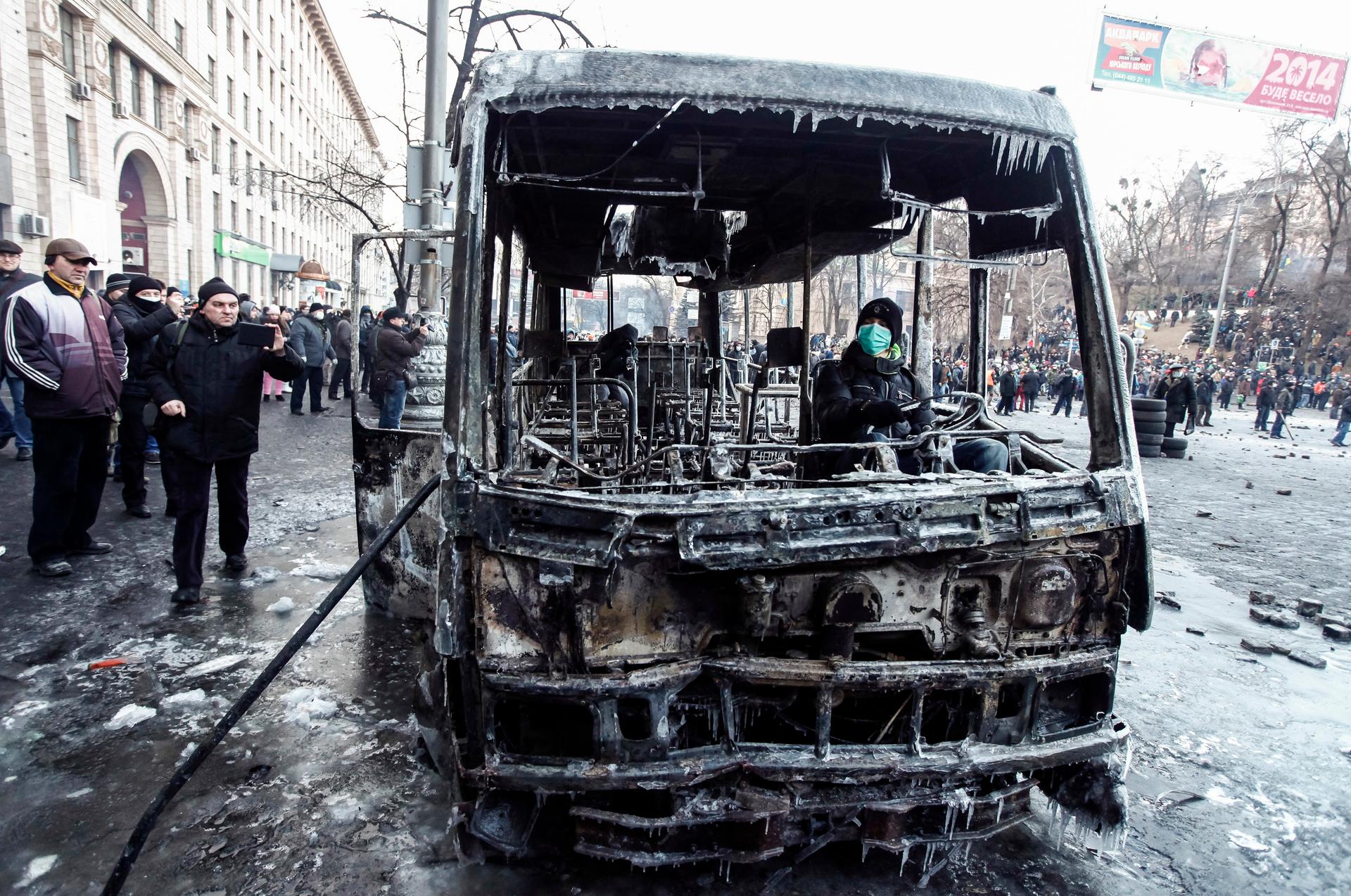New clashes in Kiev, reviewing the guest list for Syria’s peace talks, and Russian fears of ‘black widows’
A pro-European integration protester sits in a burnt police bus after a rally near government administration buildings in Kiev January 20, 2014. With tension still high, about 1,000 protesters confronted police on Monday near Kiev’s main government headquarters.
Tensions remain high in the Ukrainian capital of Kiev after a night of violent clashes between police and protesters.
President Victor Yanukovych is due to meet with pro-EU demonstrators and opposition leaders to try and resolve the crisis. The violence on Sunday evening was the worst since activists began holding demonstrations nine weeks ago to protest the government's decision to reject a political agreement with the European Union.
The clashes occurred after Ukraine's parliament passed new laws restricting free speech and public protest and increasing the powers of the police, as the BBC reports.
(Editor's note: The Global Scan can be delivered straight to your inbox every weekday. Just register and sign up today.)
An unwanted guest briefly threatened the Syria peace talks
On Sunday, UN General Secretary Ban Ki-moon invited Iran to participate in the multi-party peace talks scheduled to begin in Geneva on Wednesday. Today, under pressure from the US and others, the UN rescinded that invitation.
The issue was over whether Iran accepted the main aim of the talks — establishing a transitional Syrian government to replace President Bashar al-Assad. Iran is considered a friend of the Assad government. The Washington Post reports that Ban Ki-moon believed Iran had accepted the terms, but it became clear today that Iranian officials had not.
The talks are seen as the best hope for finding a peaceful solution to the stalemate in Syria. Members of the main Syrian opposition groups threatened to pull out of the talks if Iran attended.
This is how Homer Simpson ends up speaking Spanish
American films and TV travel far beyond US borders and the English language. And when they head to Latin America, it is Mexican voiceover artists who typically dub the characters' voices into Spanish. Already paid little, those artists are now losing their work.
PRI's The World found that the companies responsible for dubbing think nothing of switching the voices for a character, to keep costs down. And now they are outsourcing the work to even lower-wage Latin American coutries.
Russia is hunting for 'black widows' thought to be targeting the Olympics
Russian security services have been warned that up to four female suicide bombers — known as "black widows" — could be heading to Sochi to target the Winter Olympics.
It's thought one of the women is Ruzan Ibragimova, an Islamic militant whose husband was killed by Russian security services last year. Imbragimova is from Dagestan in the Caucasus region, where Islamic militants have been trying to break away from the Russian Federation and establish an independent Islamic state. NBC news has more details on the manhunt underway for these women, who may have already slipped through Russia's "ring of steel" around the Olympic venue.
The American ambassador to Japan speaks out over dolphin hunt
Caroline Kennedy, the new US ambassador to Japan, has criticized the traditional dolphin hunt held every year in western Japan. Kennedy tweeted her concerns regarding the "inhuman" nature of dolphin fishing over the weekend.
Fishermen herd hundreds of dolphins into a bay before selecting some to be released back into the wild and some to be reared in captivity. The rest are killed for their meat, often by fishermen in wetsuits. The annual event has long drawn protests. Reuters reports that Japanese officials told a news conference on Monday that the practice is carried out in accordance with the law.
US sailors claim radiation sickness from Fukushima
US sailors were among the first responders providing humanitarian aid after a tsunami caused meltdowns at Japan's Fukushima reactors. Now some are suing Japan's electric company, TEPCO, saying radioactive exposure has destroyed their health.
Living on Earth talked to Steve Simmons, a sailor who is now confined to a wheelchair and blames his repeat illnesses on the radioactive contamination he and his shipmates experienced. The lawsuits face an uphill battle because of the complexity of the claims and who is responsible.
Setting the record straight
An edition of the Global Scan went out over the weekend with a photo of an artificial sunrise played on a giant digital screen in Beijing's Tiananmen Square. While the image is real, it was actually just a small part of an ad promoting China's Shandong province — not some dystopian reminder of sunrise in smog-filled Beijing, as we reported.
Smog is a major problem in Beijing and many Chinese cities, but it hasn't gotten to the point where government officials are showing people videos of the Sun. Tech In Asia unearthed the inaccuracy, which had originally been reported by Britain's Daily Mail and then picked up by Huffington Post, Time and other news outlets.
What we're seeing on social
Weather around the world
The heat that delayed and disrupted the Australian Open last week was eerily familiar to residents of Argentina and Uruguay. Temperatures of up to 108 degrees, as well as high humidity, made the situation uncomfortable in the South American nations, according to AccuWeather. Monday is forecast to be hot and humid, with storms Tuesday before the heat returns Wednesday. Storms and cooler weather are expected toward the end of the week.
